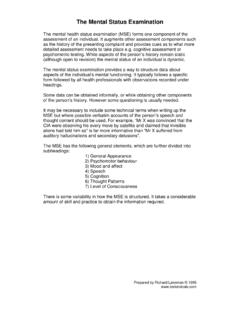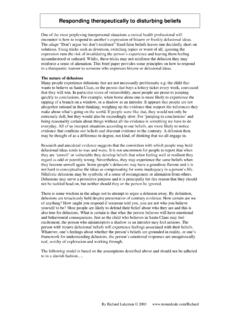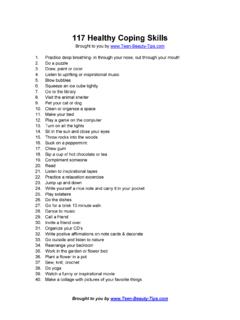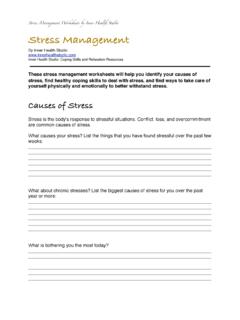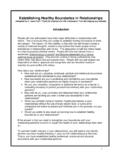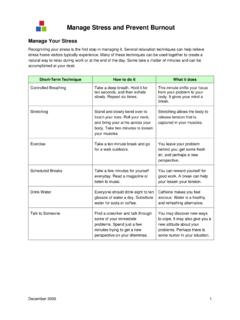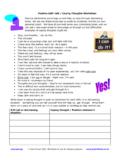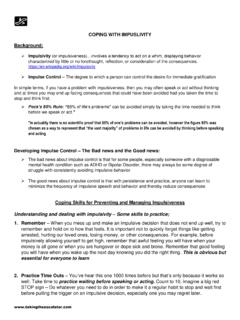Transcription of Coping with voices - testandcalc.com
1 Coping with voices Hearing voices is an extra-ordinary but relatively common experience. Hallucinations are associated with a wide range of medical and psychiatric conditions but people without any discernable illness can also experience them. Medication or treatment of an underlying illness may completely remove voices or diminish their frequency, volume or intensity. There are also many non-pharmacological things that people have found helpful to reduce distress associated with voices and to control the experience. Attitude: It is natural to feel stressed when one begins to hear voices but it is important not to panic. voices are generated by the mind; therefore they can seem to know a lot about you, your feelings and impulses. However, they cannot harm you and they have no power or authority. Accept the voices and try and adopt a scientific attitude to them. That is, experiment with strategies to cope with , control them and even learn from them.
2 Distinguish voices from other perceptions: Whilst voices can appear very similar to hearing people who are physically present there are often differences. Consider how the voices are different does the volume change when you walk away from the apparent source? Are they physically impossible? For example, are they voices of friends, family or acquaintances who are not present? Stay healthy: Non-prescribed and illegal drugs like cannabis, speed, excessive coffee, and alcohol can make the experience of hearing voices worse and affect your ability to cope with them. Do things to remain healthy eat well, exercise, and make time to relax. Controlling anxiety is considered very important in Coping with voices . Self-Monitor: Many people can identify particular times of the day, places, thoughts, states of mind, moods or intentions that precede episodes of hearing voices . If patterns are recognised then you may be able to avoid the situation or deal with the emotion that triggers the voices .
3 In some instances the content of voices may reflect unconscious conflicts. For example, for some people the intention to eat triggers voices saying derogatory things about the person's appearance reflecting unconscious concerns about body image. A qualified psychotherapist or mental health professional may be of assistance in working through such conflicts. Control strategies: A large number of strategies can assist in controlling hallucinations but what works for one person may not work for another. There is some consensus that activities which are meaningful, demand attention, require listening, talking and moving are most helpful. Here are just a few examples: Talk Most people find that voices diminish when they talk to others or even when they talk when alone. If alone try reading an interesting book out loud, sing or whistle to a favourite tune. In public if you feel compelled to respond to voices , consider using a mobile phone.
4 Try playing card games or puzzles whilst talking out loud. Listen to music Listen to music that is enjoyable to you. MP3 players with headphones are considered particularly helpful. Maintain a list of uplifting anti- voice music. Read out loud Reading something interesting can be helpful. Reading or summarising what has been read out loud can be even better Earplugs Some people find that using inexpensive wax earplugs provides temporary relief from voices . Experiment with blocking different ears (start with the right ear first if right handed). Avoid places or situations where there is a lot of un-patterned background noise busy roads, or places where there is a lot of background noise, as these may increase the intensity of voices . Dismiss the voices Some people find that firmly telling the voices to stop or that they will be attended to latter provides some relief. Talk to other voice hearers about what helps Other people that have coped with the experience of hearing voices have often-developed novel Coping strategies.
5 They may not work for you but they may be worth trying or adapting to your needs. Organisations such as the Mental Illness Fellowship have recourses and self-help books dealing specifically with hearing voices . For some people it is not the hearing voices but rather the beliefs that arise about the voices that is problematic. Some people have a tendency to ascribe special qualities to or accept the wisdom of voices without question. Keep an open and sceptical mind and talk to a mental health professional about your assumptions about voices and seek advice about Coping . Prepared by Richard Lakeman 2003.

